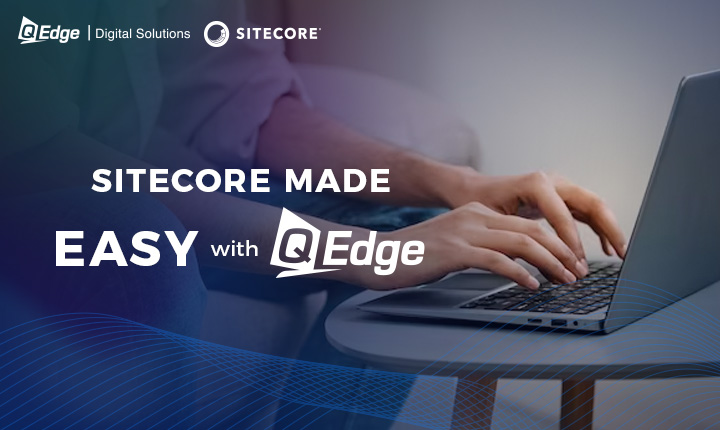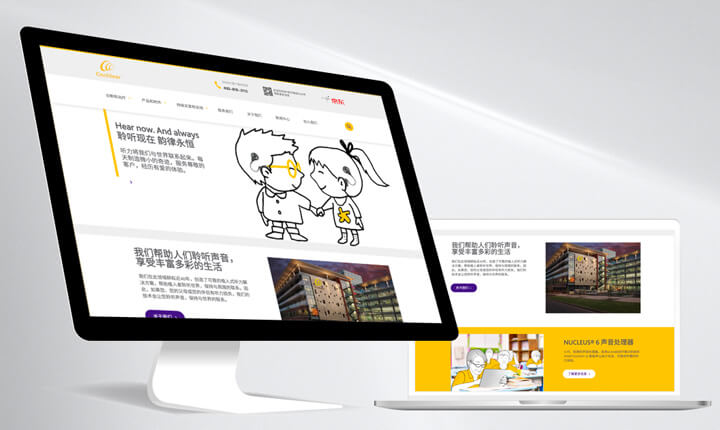The digital experience platform (DXP) market is fiercely competitive, with many players vying for the attention of enterprise customers. Among the top contenders are Sitecore and Adobe, each offering a robust set of tools to help businesses manage their digital content and experiences across multiple channels. Sitecore vs. Adobe AEM, How do you know which platform is the right fit for your organization? In this article, QEdge will take a closer look at Sitecore and Adobe AEM, comparing their strengths and weaknesses to help you make an informed decision.

Okay, let's start by reviewing the following chart.
Sitecore vs. Adobe AEM, Which Reigns Supreme?
| Feature | Sitecore | Adobe AEM |
|---|---|---|
| Core Technology Stack | ◼Based on .Net ◼Visual Studio IDE with extensive NuGet libraries and better collaboration, testing, and debugging capabilities | ◼Based on Java ◼Eclipse with better performance on Linux/Mac, but more version compatibility issues with plugins |
| Skill Requirements | ◼Consistent with .Net, only requires knowledge of .Net and Javascript | ◼Combines different architectures, requires knowledge of a wide range of technologies |
| Customization | ◼Highly flexible and customizable, suitable for enterprises with particular needs ◼Allows customization of schedulers and events ◼Robust native pipeline customization | ◼Integration between different solutions can be complex due to technological heterogeneity ◼Allows customization of schedulers and events, but only Sling servlets can be customized |
| Content Structure | ◼Structured content ◼Flexibility depends on template design and best practices | ◼Unstructured content ◼Highly flexible, but can quickly become unmanageable without proper standardization |
| Storage | ◼Data can be stored in files or databases (SQL) ◼The database is recommended for real-time synchronization | ◼Data can only be stored in files (JCR) ◼File synchronization can be a headache, especially for large sites |
| Scalability | ◼Consistent technology and database structure make it easy to scale in IaaS, PaaS, and containers ◼Officially supports Docker ◼Officially supports Redis cache | ◼Difficult to scale, especially in cloud environments ◼Docker is not officially supported ◼Officially does not support the Redis cache |
| Upgrading Process | ◼Provides complete backup, diagnostic, and upgrading tools ◼Provides detailed installation and upgrading guidelines | ◼Requires careful backup of related files by the customer's operations team ◼Disaster recovery and restoration are complex and challenging for operations |
A brief overview of Sitecore
Sitecore is a leading Content Management System (CMS) and Digital Experience Platform (DXP) that enables businesses to create, manage, and deliver personalized digital experiences to their customers.
With a robust suite of marketing automation, content management, customer data management, and analytics tools, Sitecore enables businesses to engage and convert their target audiences at every stage of the customer journey. Sitecore's flexible and scalable architecture can be tailored to meet the unique needs of businesses of all sizes and industries, making it a popular choice for enterprises, mid-market companies, and small businesses alike. With Sitecore, organizations can drive growth, increase customer loyalty, and achieve their digital transformation goals.

Key Features of Sitecore
Sitecore is built on the Microsoft .NET framework and offers a wide range of features, such as:
- Content Management: Sitecore allows users to author, edit, and manage digital content with a user-friendly interface and a powerful versioning system.
- Experience Management: Sitecore's Experience Platform (XP) enables organizations to collect and analyze customer data, creating personalized experiences across multiple channels.
- Marketing Automation: Sitecore offers built-in marketing tools, such as email campaigns, A/B testing, and goal tracking, to help businesses optimize their marketing efforts.
- E-commerce: Sitecore Experience Commerce (XC) provides a platform for creating e-commerce solutions that seamlessly integrate with the CMS and DXP.
- Integration: Sitecore supports integration with various third-party systems, such as CRM, ERP, and marketing automation tools, through APIs and connectors.
Successful Application Case
Cochlear Ltd., with its industry-leading medical devices and technology, is working to give the gift of hearing to those with profound deafness. Cochlear medical devices can help deaf people hear and experience sounds for the very first time. The company is committed to providing hearing solutions that improve people's quality of life.
A Big Challenge: Transform from B2B to B2C
Cochlear China sought to build consumer and brand awareness for cochlear implant technology, demonstrating its affordability and benefits. The business required a digital platform to easily provide information to consumers, raise brand awareness, and market products.
The Sitecore digital platform enables Cochlear China to better engage and interact directly with consumers online, providing information on hearing treatments, patient stories, and different hearing options. With the support from Qedge, Cochlear successfully gave the gift of sound to millions.
The partnership with Sitecore and QEdge Digital Solutions to localize for the Chinese market yielded impressive growth for Cochlear China, including:
- A 56% year-over-year increase in brand awareness
- A 90% increase in consumer engagement
- Web traffic consistently rose between 10% to 30% every two months
These benefits contributed to Cochlear’s success in providing advanced hearing solutions that transform people’s lives. By localizing its digital presence for the Chinese market, Cochlear China was able to significantly grow its brand awareness, consumer engagement, and web traffic – demonstrating the value of a tailored digital experience platform. See the details here.
A Brief Overview of Adobe AEM
Adobe Experience Manager (AEM) is a comprehensive content management solution and digital experience platform developed by Adobe. It is part of the Adobe Experience Cloud suite of products and is designed to help businesses create, manage, and optimize digital experiences for their customers.
AEM provides a range of powerful tools for content authoring, asset management, digital asset management, workflow management, and more, all within a single, unified platform. AEM also offers robust capabilities for personalization, targeting, and testing, enabling businesses to deliver highly relevant and engaging experiences to their customers.

Key Features of Adobe AEM
Key features of Adobe AEM include:
- Content Management: AEM provides a powerful and user-friendly interface for managing and authoring digital content, including support for workflows, versioning, and multi-language capabilities.
- Digital Asset Management (DAM): AEM Assets allows for the management of digital assets, such as images, videos, and documents, making it easy to organize, search, and distribute assets across different channels.
- Personalization: Adobe Target integration enables businesses to deliver personalized content and experiences to users based on their behavior and preferences.
- Forms and Workflows: AEM Forms provides tools for creating and managing complex forms, while AEM Workflows enables users to automate content review and approval processes.
- Integration: AEM supports integration with other Adobe Experience Cloud solutions, such as Adobe Analytics and Adobe Campaign, as well as with third-party systems, through APIs and connectors.
Final thoughts and considerations for choosing a CMS
When it comes to selecting the right DXP option, the choice between Sitecore and Adobe Experience Manager is not always straightforward. While Sitecore may have the advantage of its vast partner network, flexible composability options, and powerful personalization capabilities, your decision ultimately depends on your existing technology stack and business objectives.
When it comes to choosing a digital experience platform, it's important to consider the level of integration and complexity involved in implementation. While the Adobe suite may offer a range of loosely coupled technologies, this can often result in added costs and complexity that may ultimately hinder your ability to fully leverage your investment.
On the other hand, the Sitecore Experience Platform provides a highly integrated solution that seamlessly combines content management, customer data management, analytics, and personalization, along with digital marketing functionality, to create truly immersive digital experiences. With Sitecore, you can unlock the full potential of your digital investments and deliver exceptional customer experiences that drive results.
So, if you're set on Sitecore, rest assured that QEdge Digital Solutions, a trusted Sitecore implementation partner, can guide you every step of the way to implement Sitecore CMS solutions.
As an indispensable partner and gold medal implementation service provider of Sitecore in China, QEdge has more than 15 years of Sitecore full version project implementation and operation & maintenance experience since 2009 Sitecore Version 5.0. The company has a Sitecore implementation team of more than 40 experts, over 90% of whom are qualified for Sitecore certification.
To date, we have provided Sitecore services to more than 50 large and medium-sized customers worldwide. With robust experience in Sitecore deployment, we have succeeded in implementing Sitecore localization projects for Cochlear, Shangri-La, Kepple Land, and other multinational enterprises.
Feel free to contact us on QEdge Linkedin.




![What It Takes to Optimize Sitecore Solution|QEdge[2024]](https://www.qedge.co/blog/wp-content/uploads/2023/10/169-320x180.jpg)



